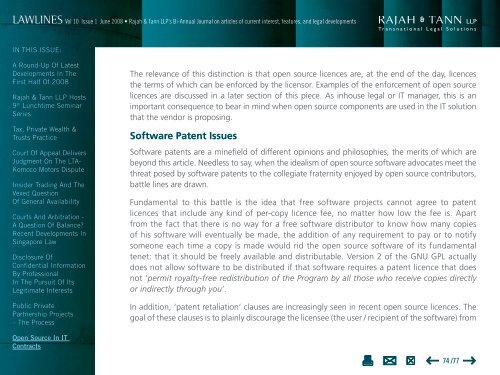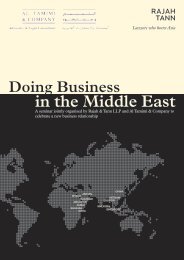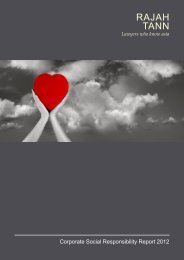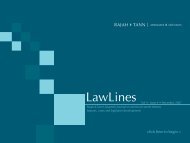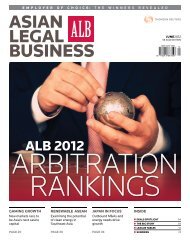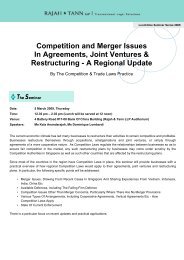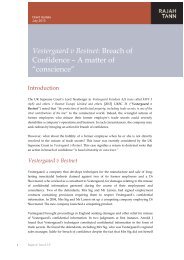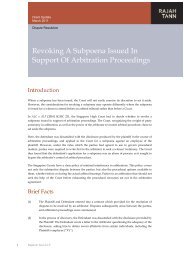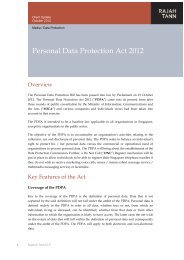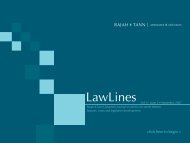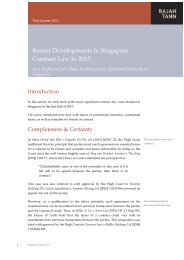Lawlines Vol 10 Issue 1 - eOASIS - Rajah & Tann LLP
Lawlines Vol 10 Issue 1 - eOASIS - Rajah & Tann LLP
Lawlines Vol 10 Issue 1 - eOASIS - Rajah & Tann LLP
Create successful ePaper yourself
Turn your PDF publications into a flip-book with our unique Google optimized e-Paper software.
<strong>Vol</strong> <strong>10</strong> <strong>Issue</strong> 1 June 2008 • <strong>Rajah</strong> & <strong>Tann</strong> <strong>LLP</strong>’s Bi-Annual Journal on articles of current interest, features, and legal developmentsIN THIS ISSUE:A Round-Up Of LatestDevelopments In TheFirst Half Of 2008<strong>Rajah</strong> & <strong>Tann</strong> <strong>LLP</strong> Hosts9 th Lunchtime SeminarSeriesTax, Private Wealth &Trusts PracticeCourt Of Appeal DeliversJudgment On The LTA-Komoco Motors DisputeInsider Trading And TheVexed QuestionOf General AvailabilityCourts And Arbitration -A Question Of Balance?Recent Developments InSingapore LawDisclosure OfConfidential InformationBy ProfessionalIn The Pursuit Of ItsLegitimate InterestsPublic PrivatePartnership Projects– The ProcessThe relevance of this distinction is that open source licences are, at the end of the day, licencesthe terms of which can be enforced by the licensor. Examples of the enforcement of open sourcelicences are discussed in a later section of this piece. As inhouse legal or IT manager, this is animportant consequence to bear in mind when open source components are used in the IT solutionthat the vendor is proposing.Software Patent <strong>Issue</strong>sSoftware patents are a minefield of different opinions and philosophies, the merits of which arebeyond this article. Needless to say, when the idealism of open source software advocates meet thethreat posed by software patents to the collegiate fraternity enjoyed by open source contributors,battle lines are drawn.Fundamental to this battle is the idea that free software projects cannot agree to patentlicences that include any kind of per-copy licence fee, no matter how low the fee is. Apartfrom the fact that there is no way for a free software distributor to know how many copiesof his software will eventually be made, the addition of any requirement to pay or to notifysomeone each time a copy is made would rid the open source software of its fundamentaltenet: that it should be freely available and distributable. Version 2 of the GNU GPL actuallydoes not allow software to be distributed if that software requires a patent licence that doesnot ‘permit royalty-free redistribution of the Program by all those who receive copies directlyor indirectly through you’.In addition, ‘patent retaliation’ clauses are increasingly seen in recent open source licences. Thegoal of these clauses is to plainly discourage the licensee (the user / recipient of the software) fromOpen Source In ITContracts74 /77


